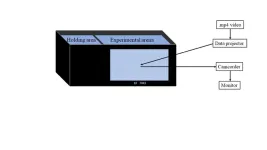(Press-News.org) COLUMBUS, Ohio – The mental distress of cognitive dissonance – encountering information that conflicts with how we act or what we believe – can lead to added pressure on the neck and low back during lifting and lowering tasks, new research suggests.
When study participants were told they were performing poorly in a precision lowering experiment in the lab, after initially being told they were doing well, their movements were linked to increased loads on vertebrae in their neck and low back.
Results showed that the higher the cognitive dissonance score, the greater the extent of loading on the upper and lower parts of the spine.
The finding suggests cognitive dissonance may be a previously unidentified risk factor for neck and low back pain, which could have implications for risk prevention in the workplace, according to researchers.
“This increased spine loading occurred under just one condition with a fairly light load – you can imagine what this would be like with more complex tasks or higher loads,” said senior author William Marras, executive director of the Spine Research Institute at The Ohio State University. “Basically, the study scratched the surface of showing there’s something to this.”
The research was published recently in the journal Ergonomics.
Marras’ lab has been studying daily living and occupational forces on the spine for decades. About 20 years ago, he found that psychological stress could influence spine biomechanics, using a study design that involved having a fake argument with a graduate student in front of research participants.
“We found that in certain personality types, the loads in the spine increased by up to 35%,” Marras said. “We ended up finding that when you’re under that kind of psychosocial stress, what you tend to do is what we call co-activate muscles in your torso. It creates this tug of war in the muscles because you’re always tense.
“In this study, to get at that mind-body connection, we decided to look at the way people think and, with cognitive dissonance, when people are disturbed by their thoughts.”
Seventeen research participants – nine men and eight women aged 19-44 – completed three phases of an experiment in which they placed a light-weight box within a square on a surface that was moved left and right, up and down. After a short practice run, researchers gave almost exclusively positive feedback during the first of two 45-minute trial blocks. During the second, the feedback increasingly suggested participants were performing in an unsatisfactory way.
To arrive at a cognitive dissonance score for each participant, changes during the experiment to blood pressure and heart rate variability were combined with responses to two questionnaires assessing discomfort levels as well as positive and negative affect – feeling strong and inspired versus distressed and ashamed.
Wearable sensors and motion-capture technology were used to detect peak spinal loads in the neck and low back: both compression of vertebrae and vertebral movement, or shear, from side to side (lateral) and forward and back (A/P).
Statistical modeling showed that, on average, peak spinal loads on cervical vertebrae in the neck were 11.1% higher in compression, 9.4% higher in A/P shear and 19.3% higher in lateral shear during the negative-feedback trial block compared to the baseline measures from the practice run. Peak loading in the lumbar region of the low back – an area that bears the brunt of any spinal loading – increased by 1.7% in compression and 2.2% in shear during the final trial block.
“Part of the motivation here was to see whether cognitive dissonance can manifest itself not only in the low back – we thought we’d find it there, but we didn’t know what we’d find in the neck. We did find a pretty strong response in the neck,” said Marras, a professor of integrated systems engineering with College of Medicine academic appointments in neurosurgery, orthopaedics and physical medicine and rehabilitation.
“Our tolerance to shear is much, much lower than it is to compression, so that’s why that’s important,” he said. “A small percentage of load is no big deal for one time. But think about when you’re working day in and day out, and you’re in a job where you’re doing this 40 hours a week – that could be significant, and be the difference between a disorder and not having a disorder.”
Marras is also principal investigator on a federally funded multi-institution clinical trial assessing different treatments for low back pain that range from medication to exercise to cognitive behavioral therapy.
“We’re trying to unravel this onion and understand all the different things that affect spine disorders because it’s really, really complex,” he said. “Just like the whole system has got to be right for a car to run correctly, we’re learning that that’s the way it is with the spine. You could be in physically great shape, but if you’re not thinking correctly or appropriately, or you have all these mental irregularities, like cognitive dissonance, that will affect the system. And until you get that right, you’re not going to be right.
“We’re looking for causal pathways. And now we can say cognitive dissonance plays a role and here’s how it works.”
This research was supported by internal Spine Research Institute funds. Co-authors included first author Eric Weston, a former integrated systems engineering graduate student at Ohio State; Afton Hassett of the University of Michigan; and Safdar Khan and Tristan Weaver of Ohio State.
#
Contact: William Marras, Marras.1@osu.edu
Written by Emily Caldwell, Caldwell.151@osu.edu; 614-292-8152
END
The George Institute for Global Health today announced data from the phase III INTERACT3 study demonstrating that a new combination of treatments for stroke due to intracerebral haemorrhage (ICH) significantly improves the chances of surviving without major disability. Results were presented today at the European Stroke Organisation Conference in Munich, Germany, and simultaneously published in The Lancet.
The INTERACT3 study is the first-ever randomised controlled trial to show a clearly positive outcome for the treatment of ICH. Timely administration of the new treatment protocol – known as a Care Bundle – centred on the rapid control of ...
In the past, it was considered unprofitable to electrify heavy goods vehicles that transport cargo over long distances. But now researchers at Chalmers University of Technology in Sweden have shown that it can be cheaper to run heavy goods vehicles on electricity than on diesel.
‘I myself am surprised by the results and hope that more haulage companies and heavy goods vehicle manufacturers will be willing to invest in electrification now that we have shown that it can be cost-effective,’ says Johannes Karlsson, Doctoral student in Automatic Control Engineering at Chalmers.
The transition ...
The Tokyo Tech InfoSyEnergy Research and Education Consortium, the Tokyo Tech Academy of Energy and Informatics (Head of Consortium and Academy Director Manabu Ihara, Prof.), and several companies such as Toshiba Corporation and Toshiba Energy Systems & Solutions Corporation are jointly developing a platform "100 kW hydrogen fuel cell - digital twin" for optimizing the design and control of a 100 kw hydrogen fuel cell that seeks to balance carbon neutrality and economic advantage by mixing renewable energy hydrogen/waste ...
A new study published in the journal Child Development from researchers at Boston College in Massachusetts, USA and the University of Queensland in Australia explores whether four- to nine-year-old-children consider past choices when making moral judgements of others. The findings showed that from the age of six, children considered what characters could have done when making judgement of how nice or mean they are behaving and that four and five- year-olds’ moral judgements were influenced only by ...
New research published in Diabetologia (the journal of the European Association for the Study of Diabetes [EASD]) shows an association between type 2 diabetes (T2D) and developing dementia in later life – with the risk of dementia increasing the earlier a person develops T2D. The study is by PhD student Jiaqi Hu and Professor Elizabeth Selvin of the Johns Hopkins Bloomberg School of Public Health, Baltimore, MD, USA, and colleagues.
Their study investigated the association between prediabetes and dementia. Prediabetes is an intermediate stage of high blood sugar, where blood sugar is high but has not yet crossed the threshold for T2D. Prediabetes ...
Avocado oil has become a popular choice for many people in recent years because of its heart-healthy benefits and versatility in cooking. However, not all avocado oil products on store shelves are created equal. Some products are labeled as “pure” avocado oil when they contain other oils or additives. No enforceable standards defining the chemical and physical characteristics of avocado oil exist yet.
Researchers at the University of California, Davis, analyzed samples of 36 private label avocado oil products and graded them based on quality and purity. Private label products are made by a third-party processor and sold under a grocery store or retailer brand label. Their ...
A new study led by investigators from Mass General Brigham has found that subanesthetic intravenous ketamine was effective and not inferior to electroconvulsive therapy (ECT) for the treatment of non-psychotic, treatment-resistant depression. Their results are published in the New England Journal of Medicine.
“ECT has been the gold standard for treating severe depression for over 80 years,” said Amit Anand, MD, director of Psychiatry Translational Clinical Trials at Mass General Brigham and Professor of Psychiatry at Harvard Medical School. “But it is also a controversial treatment because it can cause memory ...
Animals using the most of efficient methods of searching for resources may well pay with their lives, scientists at the University of Bristol have discovered.
The findings, published today in Behavioural Ecology, reveal why animals may not always use a searching strategy that maximises results.
How animals move through their habitat, particularly in search for food, is a major question in biology, and has application in how animals will respond to environmental change.
Numerous studies have demonstrated that a special kind of movement, known as Lévy motion, increases the ability to find resources because it includes long-distance moves ...
EMBARGO: 00.01 BST (London time) on THURSDAY, MAY 25, 2023 / 19.01 US EDT on WEDNESDAY, MAY 24, 2023
Heavy drinkers risk muscle loss, new study finds
Peer reviewed – observational study - humans
Heavy drinkers could be putting themselves at risk of muscle loss and frailty in later life, according to new research from the University of East Anglia.
A new study published today shows with statistical modelling that people with the lowest amount of muscle were drinking 10 units or more a day – about ...
Vegetarian and vegan diets are linked to lower levels of cholesterol and fats in your blood, according to an analysis of all the evidence from randomised trials published since 1982.
The authors of the study, which is published in the European Heart Journal [1] today (Thursday), say this means that plant-based diets can play a significant role in reducing blocked arteries, thereby lowering the risk of heart and blood vessel diseases, such as stroke and heart attacks.
The researchers looked at 30 randomised trials with a total of 2,372 participants, published between 1982 and 2022, that quantified the effect of vegetarian or vegan diets versus omnivorous diets on levels ...


